Mar 13, 2020

When planning to open a restaurant, what are some rules and regulations that entrepreneurs have to follow? This article has the answers. We have gathered the laws, regulations and rules related to opening restaurants to share with you. Every single one of them is important, and if you don’t do things right from the beginning, you might suffer legal penalties such as fines and imprisonment.
Public health laws: the basics that every restaurant needs to be clear about
The Public Health Act, B.E. 2535 (A.D. 1992), states that restaurants are classified as food distribution facilities under the supervision of local administrative governmental agencies such as the Bangkok Metropolitan Administration, municipalities, sanitation districts, provincial administrative organizations, sub-district administrative organizations, and Pattaya City. So people looking to run a restaurant have to comply with the Public Health Act as follows:
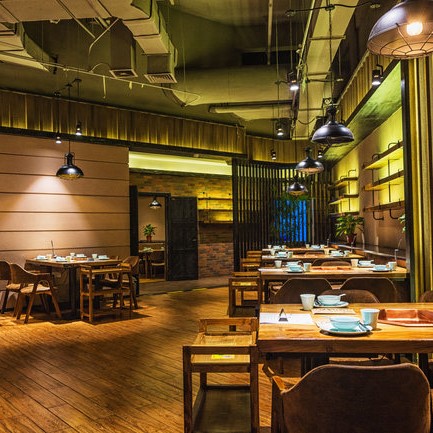
Restaurant owners with restaurant areas greater than 200 square meters are required to apply for a business permit with a local official. Only once a permit is granted will they be allowed to open for business. A permit will have a duration of one year, and renewal has to be applied for before the permit expires.
Restaurant owners with restaurant areas not exceeding 200 square meters have to notify a local official in order to request for a certificate of notification subsequent to opening business and also notify an official whenever they want to quit or transfer their business.
You can apply for a permit, renew a permit or request for a certificate of notification at various government agencies as follows:
✔️ A Bangkok district office (for restaurants located in Bangkok).
✔️ A municipal office (for restaurants located in municipal districts).
✔️ A sub-district administrative organization (for restaurants located inside sub-district administrative organizations).
✔️ Pattaya City Office (for restaurants in Pattaya).
✔️All restaurant owners have to comply with all specifications and terms set by their respective local administrative organizations.
✔️Restaurant owners who open their restaurants without permits are liable to imprisonment not exceeding six months or fines not exceeding ten thousand baht.
✔️Restaurant owners who open their restaurants without certificates of notification are liable to imprisonment not exceeding three months or fines not exceeding five thousand baht.
✔️ Restaurant owners are required to display their permits or certificates of notification in conspicuous and visible locations inside their restaurants. People who fail to do this are liable to fines not exceeding five hundred baht.

Ministry of Public Health Laws on the Sanitation of Food Distribution Facilities 2018
Commonly known as food sanitation rules, they are regulations that every restaurant has to strictly follow. Because people who neglect them might suffer from penalties, let’s take a look at what they are.
Section 1: Sanitation of Food Distribution Facilities
Section 1: Sanitation of Food Distribution Facilities
- Food distribution facilities such as places used to prepare foods must be clean, sturdy, undamaged, well-ventilated, adequately-illuminated, with appropriate places and equipment for washing or cleaning hands, and tables used to prepare foods have to be raised at least 60 centimeters from the floor and in good condition.
- The toilets of food distribution facilities must be managed to ensure good working and usage conditions while being available in sufficient numbers with good hygiene, drainage and partitioning. Furthermore, the doors must not open directly to food preparation areas, unless the toilets are always kept clean and appropriately partitioned with doors to toilet stalls closed at all times and wash basins are sanitary and available in sufficient quantities.
- Waste has to be managed effectively.
- Wastewater and clean water have to be managed without food scraps. Food scraps and grease have to be separated before draining wastewater into the water drainage system in line with the standards set by laws governing environmental quality promotion and preservation.
- Preventive measures must be set in place against animals, disease-carrying insects and pets.
- Fire prevention equipment must be installed.

Section 2 – Food Distribution Facilities
7. Fresh foods that are prepared must be high-quality, clean, safe and stored at appropriate temperatures separately without being covered or placed on the floor or otherwise placed in a manner that might cause food contamination.
8. Dry foods must not be contaminated, containers must be tightly sealed and seasonings must comply with standards.
9. Processed foods must be kept in clean containers placed at least 60 centimeters above the floor.
10. Drinking water and other beverages that are tightly sealed must be placed at least 15 centimeters above the floor. Furthermore, the outside of their containers have to be cleaned before serving. In addition, beverages not stored in tightly sealed containers must be placed at least 60 centimeters above the floor.
11.The water used must be high quality and not be below the standards of the Department of Health.
12.Ice must be managed for issues like hygiene and kept in tightly sealed containers raised at least 15 centimeters above the floor with the edges of container openings raised at least 60 centimeters above the floor. In addition, water from containers must not be drained into areas where said containers are placed, and tongs or ice buckets used must be clean and have proper handles, and foods and other items must not be placed in the same container as ice used for consumption.
13.For water, the water has to be from a municipal water supply or equivalent.
14.Chemicals, cleaning agents, and toxic substances have to be labeled and clearly indicated by signs and warnings and must be separated from places used to prepare or sell food, and using food containers to store chemicals is strictly prohibited.
15.Use of cooking gas as a fuel for preparing or flavoring foods on tables or eating areas inside food distribution facilities is strictly prohibited.
16. Use of methanol or methyl alcohol, except for solid alcohol, as a fuel for preparing, flavoring or warming foods is strictly prohibited.
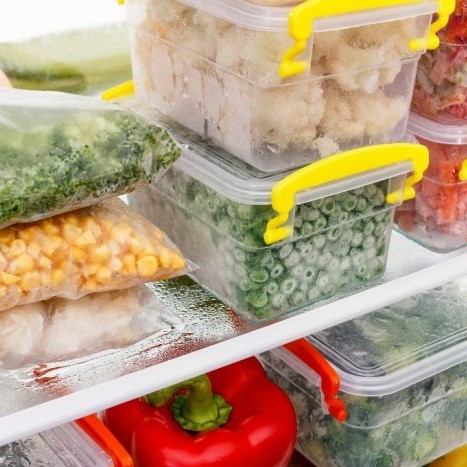
Section 3 – Concerning Containers and Equipment Used in Food Distribution Facilities
17. The materials used must be safe, in good condition and stored at least 60 centimeters above the floor and must be protected from contamination. Serving spoons must be used, and refrigerators, freezers, ovens, and microwave ovens must be in good condition and not damaged.
17. The materials used must be safe, in good condition and stored at least 60 centimeters above the floor and must be protected from contamination. Serving spoons must be used, and refrigerators, freezers, ovens, and microwave ovens must be in good condition and not damaged.
18. Always put away equipment used to prevent animals and insects, and always sterilize containers after cleaning.
You can learn more about professional ingredient storage in a free online course! You will be taught how to properly store each type of ingredient and maintain ingredient freshness.
Section 4 – Concerning Business Owners, Persons in Contact with Food and Changes According to Ministerial Regulations
19. These individuals must be healthy and not infected with communicable diseases or be carriers of communicable diseases or repulsive skin diseases and must be trained in accordance with the stipulations of the Minister with the advice of the Committee as announced in the Royal Government Gazette. In addition, persons who come into contact with food must wear clean clothes and clean protective equipment that prevent food contamination and must wash their hands and refrain from committing any action that causes food contamination or diseases.
19. These individuals must be healthy and not infected with communicable diseases or be carriers of communicable diseases or repulsive skin diseases and must be trained in accordance with the stipulations of the Minister with the advice of the Committee as announced in the Royal Government Gazette. In addition, persons who come into contact with food must wear clean clothes and clean protective equipment that prevent food contamination and must wash their hands and refrain from committing any action that causes food contamination or diseases.
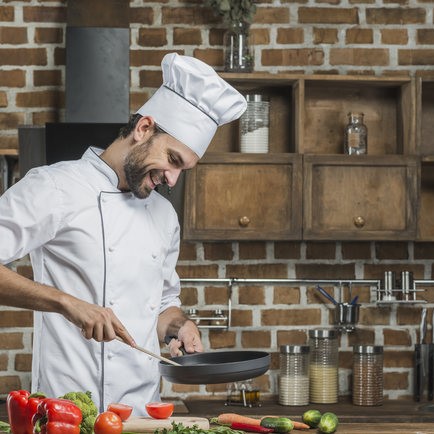
20. Food distribution facilities granted permits or certificates prior to the enforcement date of these ministerial regulations are required to make changes within 180 days subsequent from the effective date of the ministerial regulations, unless said facilities have less than 200 square meters of space, in which case changes are to be made within 1 year, while the changes to comply with Clause 21 concerning training in line with requirements are to be made within 2 years.
Even though penalties have not been explicitly specified for restaurants that fail to meet these ministerial regulations, the powers vested in the 2017 revision of the Public Health Act of 1992 could be used to administer penalties, so that means that there could be a 50,000-baht fine that you need to watch out for.
Labor laws: Don’t overlook them!
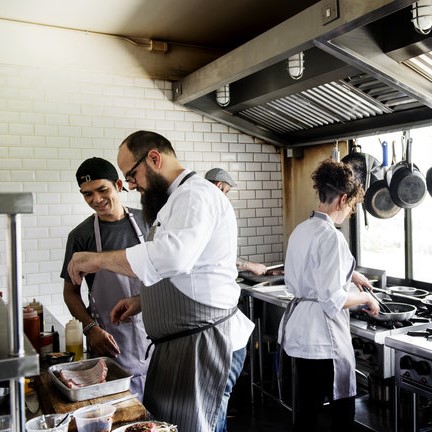
Another category of laws that restaurant owners have to pay attention to in order to avoid fines or imprisonment is labor law.
One area where entrepreneurs often violate labor laws about without knowing is in the category of “Use of General Labor”. Accordingly, the Labor Protection Act contains stipulations on labor use, holidays and leave days, all of which are things that entrepreneurs need to learn and be careful about. Otherwise, legal violations might lead to employees filing reports and you suffering legal penalties. Thus, we offer you some details about specific laws that entrepreneurs often make mistakes in for you to study as follows:
- Regular Work Hours
Ordinary work cannot exceed 8 hours/day or as otherwise agreed upon between the employer and the employee and must not exceed 48 hours/week.
- Break Times
During Regular Work Times: At least 1 hour/day after the employee has worked consecutively for no more than 5 hours. Otherwise, breaks could be agreed upon in separate intervals, although they must combine to at least 1 hour/day. For work in restaurants or beverage shops that do not open for service consecutively each day, breaks may exceed 2 hours/day. In addition, the employer may choose not to allocate break times in cases where the nature or condition of the work requires consecutive work hours; however, this can only happen with the consent of employees or during emergencies.
Before overtime work: In cases where employees are going to be instructed to work at least 2 hours overtime in addition to normal work hours, the employees need to be provided at least 20 minutes of break time ahead of their overtime work.
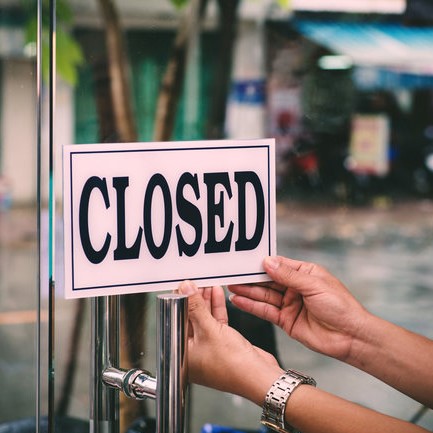
3. Holidays
Weekend holidays: At least 1 day/week spaced no more than 6 days apart. For hotel work, transport work, forest work, work in remote areas or other work stipulated in ministerial regulations, agreements can be made to accumulate and postpone weekend holidays to take place at any time within 4 consecutive weeks.
Traditional Holidays: At least 13 days/year, including National Labor Day. These are to be considered based on annual government holidays and local religious or traditional holidays. If a traditional holiday coincides with a weekend holiday, provide a compensatory holiday for the traditional holiday on a following work day. For work in hotel, theater, restaurant, beverage shop, and other similar businesses, mutual agreements can be made for compensatory holidays for traditional holidays to take place on other days or for wages to be paid in place of holidays.
Annual Vacation Holidays: At least 6 work days/week for employees who have worked consecutively up to 1 year. Agreements can be made in advance for annual vacation days to be accumulated and combined with those of other years.

4.Leave
Sick Leave: Employees can take sick leave according to actual sick days with pay for no more than 30 days, and if an employee takes a leave lasting 3 consecutive days or more, the employee has to present a medical certificate.
Personal Leave: Employees can take leave for necessary personal errands by no more than 3 days per year with normal pay not exceeding 3 days per year.
Military Service Leave: Employees may take leave according to the actual number of days required for military service with pay throughout the entire duration of each leave but without exceeding 60 days per year.
Maternity Leave: Pregnant female employees may take maternity leave lasting no more than 98 days per pregnancy, including days for pregnancy check-ups before delivery, and employers are required to pay wages for no more than 45 days of said leaves.
Training Leave: Employees may take training leave without pay.
In addition to labor laws that restaurant owners should know, managing employees in the restaurant business is another important topic. If you manage people well, your business will also do well. Click here to take a free online course
And you can also read articles on how to apply for a business permit and register commercially and how to apply for a permit to sell alcoholic beverages. For other issues such as music licensing and live sports broadcasting laws, we will share them with you on another occasion.
